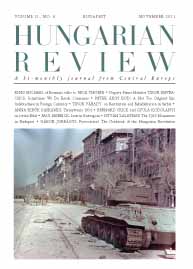Silenced Voices – Hungarian Plays from Transylvania
Silenced Voices – Hungarian Plays from Transylvania
Author(s): Enikő BollobásSubject(s): Theatre, Dance, Performing Arts
Published by: BL Nonprofit Kft
Summary/Abstract: Silenced Voices – Hungarian Plays from Transylvania is an impeccable volume that collects five of the “forgotten playwrights” of Central Europe: András Sütõ (1927–2006), János Székely (1929–1992), Géza Páskándi (1933–1995), Csaba Lászlóffy (1939-), and Géza Szõcs (1953-). They are Hungarian dramatists from Transylvania, each represented by one play, rendered in an English full of life, ready to be performed: András Sütõ’s Advent in the Hargita Mountains (Advent a Hargitán), Csaba Lászlóffy’s The Heretic or a Plague of Slugs (Az eretnek), Géza Páskándi’s The Avenger, the Gatekeeper, or It Is Requested that You Wipe Your Feet (A bosszúálló, a kapus), János Székely’s Caligula’s Governor (Caligula helytartója), and Géza Szõcs’s A Christmas Play or Uncle Louie and the Little Ones (Karácsonyi játék). But the work of revival that translators Csilla Bertha and Donald E. Morse have performed does not stop here: not only are the plays and their authors brought into limelight, but through them Hungarian drama in Romania is also made visible to the English audience. Authors from a community repeatedly denied or ignored through history – one that, as the translators note in the Introduction, has “fallen through the cracks of history and scholarship” (1) and has been, through the many rewritings of history, so often “disappeared” (3) – magically comes alive in this volume through the sympathetic ink and cultural memory work of Bertha and Morse. But if this literature is little known outside of Transylvania, within Transylvania its role went far beyond the cultural industry: indeed, theatre became the sacred stage for the “exiled words” of the mother tongue, allowing its users the dignity of speaking out loud (even, or especially, in instances when this right was curbed – at such times, the curbing could result in public spectacles of communal protest, bringing greater coherence to the community than undisturbed performances might have). Much of this literature is tragic, expressive of a tragic sense of life: “fate literature”, as it is often called, in which the writers act as the conscience of the nation because they deal with questions of national survival. And, as Csilla Bertha puts it in an essay elsewhere, all these “ancient layers of community feeling” are merged “with modern existential
Journal: Hungarian Review
- Issue Year: II/2011
- Issue No: 06
- Page Range: 118-125
- Page Count: 8
- Language: English

